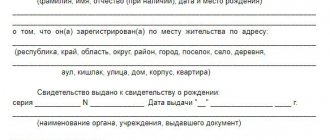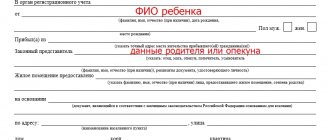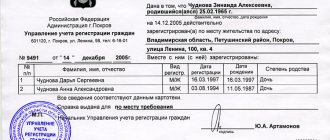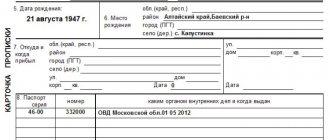Grounds for registration
An adult can be registered only with his parents, or with one of them if the parents live separately. However, despite this, for every minor there must be a basis for his registration.
For minors, regardless of whether they have reached the age of fourteen or not, the following legal grounds for registration are mandatory
- The first reason is the fact of the birth of the child;
- The second reason is change of place of residence.
The documentary basis for registering a minor child is the presence of a birth certificate (for newborns and children under the age of fourteen), as well as a document confirming the need to register with both parents or with one of them (based on their registration in the same premises where the child will be registered).
Legal features of registering a minor
Registration of minors in residential premises at the place of residence of their parents is carried out, in accordance with the law, regardless of the wishes of the owner of the housing. If parents who have permanent registration in the corresponding residential premises, which are owned by some third parties, wish to register their children, registration of minors, according to regulatory legal acts, is carried out even without the consent of the owners of the specified premises .
It is also not required to register children in this case with the consent of the landlord, tenant or citizens permanently living in the relevant residential premises from the state, municipal or some specialized housing stock. This rule also applies when registering newborns.
The current procedure for registration of citizens allows for the possibility of registering a teenager who has reached the age of fourteen at his place of residence separately from his parents (legal representatives).
In this case, for permanent registration of a minor, it is necessary to submit documentation similar to the list of documents that should be collected for registration of an adult Russian citizen. Additionally, it is necessary to submit written consent to the stated registration procedure from the legal representative of the teenager to the territorial migration service.
The end result of obtaining a permanent residence permit for a minor is the issuance of a corresponding certificate of registration at the declared place of residence (for persons under 14 years of age) or the affixing of a special mark (stamp) in the civil passport, which also confirms that the citizen has registration at the designated place of residence (for minors 14-18 years old).
This rule on issuing a certificate with registration has been in effect since March 2008. Accordingly, before this period it was not issued to minors or their parents
. If the child’s registration was carried out before the specified date, the document confirming the registration is the house (apartment) book or registration card.
Registration of minor children at the place of residence of their parents has significant features compared to registration of persons over 18 years of age. Special rules and procedures related to the registration of minor children at the address where their parents live will be discussed in this article.
Law on registration of minors at the place of residence of parents
Registration of a minor at the place of residence
Features of registration of minors from 14 to 18 years old
Procedure
In order to register a child, regardless of whether he has reached the age of fourteen years or not, you must choose one of three options for submitting documents:
- By direct visit to the migration authorities (territorial division of the Main Directorate for Migration Issues of the Ministry of Internal Affairs of the Russian Federation);
- Through contacting multifunctional centers;
- By submitting an initial application through the State Services website.
If you choose the option of directly submitting documents to the migration authorities, then either the child’s parents (if he is under fourteen years old) or the child himself, but in the presence of his parents (if the child’s age is between fourteen and eighteen years old) must submit documents. The same procedure applies to submitting documents through multifunctional centers.
If we are talking about submitting documents through State Services, then only parents can submit an initial application (minors cannot be registered on this resource).
In order for the registration of a child at the place of residence to be successful, two steps must be taken:
- Submit an application and all accompanying documents to the migration authorities in one of the following ways;
- After the specified period, receive a registration certificate (for a child under fourteen years of age), or put the appropriate registration mark in the passport (if the child has already turned fourteen years old).
It is necessary to submit documents for registration within no more than two weeks from the moment the child arrives at the place of residence. If we are talking about a newborn, then this period will be seven days from the date of receipt of the birth certificate (from the moment the child is born - no more than two weeks, with the exception of special cases, for example, the birth of a baby with serious pathologies, due to which the parents cannot register all necessary documents on time, but must notify the registry office of such a situation).
Where to submit documents to obtain a certificate of temporary registration of a child?
Citizens of the Russian Federation and foreigners should register by contacting the following services:
- Civil registry office to record the fact of birth and obtain the corresponding document;
- guardianship authorities to obtain supporting documents;
- FMS for registration of temporary registration at the location;
- local authorities that have the right to accept documents for their further transfer to the competent authorities.
This is important to know: How and where to get a registration certificate
Required documents
When applying for registration at the place of residence for a child who has not reached the age of fourteen, all necessary documents are submitted both for the child and for one of the parents (if they live together), or for the parent with whom the child will live.
The list of documents will include:
- Registration application (to be filled out by the child’s parent or guardian, or by him independently, depending on age);
- The child’s birth certificate or passport;
- Passport of the parent with whom registration will be carried out;
- A certificate from the place of residence of the second parent confirming that the child does not live with him;
- Consent of the parent with whom the child does not live to register the latter at his place of residence;
- If the parents are in a registered marriage, you will also need a certificate of such a union;
- If the child was previously registered at a different address, it will also be necessary to provide a departure sheet and an arrival sheet (the latter is filled out when writing an application for registration);
- If the house where registration will be carried out has a house register, it will need to be provided, since migration officials must make sure that it is possible to register a child in a specific territory without infringing on his rights.
If we are talking about registering a child aged fourteen to eighteen years, then the following will be added to the list of documents:
- Consent of the owner of the premises where the child will be registered (if he is registered separately from his parents, for example, with his grandmother);
- Notarized consent of the parents to register the child separately from them.
All of the above documents are submitted to the migration authorities and sent for verification, upon receipt of the results of which the registering specialist makes a decision on the possibility of registering the child or on refusal to do so.
Question and answer: about registration of minors without parents
Question:
I ask you to select material on the issue: temporary registration at the place of residence of minors over 14 years old, is it possible without registration at the same time as a parent (from a stranger, but with the consent of the parents).
The MFC said that without a parent, one child can be temporarily registered only from the age of 16.
Answer:
1. The place of residence is the place where a citizen permanently or primarily resides. A citizen who informs creditors, as well as other persons, about his other place of residence bears the risk of the consequences caused by this.
2. The place of residence of minors under fourteen years of age or citizens under guardianship is the place of residence of their legal representatives - parents, adoptive parents or guardians. (Source - Article 20, “Civil Code of the Russian Federation (Part One)” dated November 30, 1994 N 51-FZ (as amended on August 3, 2018) {ConsultantPlus} )
The registration authority is obliged to register a citizen at the place of residence no later than three days from the date of presentation of documents (submitting an application and documents in the form of electronic documents) for registration. (Source - Article 6, Law of the Russian Federation dated June 25, 1993 N 5242-1 (as amended on April 3, 2017) “On the right of citizens of the Russian Federation to freedom of movement, choice of place of stay and residence within the Russian Federation” {ConsultantPlus} )
Name of public service
22. State service for registration of citizens of the Russian Federation at the place of stay and place of residence within the Russian Federation <1>.
———————————
<1> Next - “registration accounting”...
2. The applicants are:
2.1. Citizens of the Russian Federation <5> who have reached the age of 14 .
———————————
<5> Next - “citizen”.
2.2. One of the parents, adoptive parents, guardians or trustees <1> of a citizen of the Russian Federation - in relation to minor citizens from the day of birth until they reach the age of 14 or citizens recognized by the court as incompetent (partially capable).
———————————
<1> Next - “legal representatives”...
An exhaustive list of documents required in accordance with regulatory legal acts for the provision of public services and services that are necessary and mandatory for the provision of public services to be submitted by the applicant, methods for receiving them by the applicant, including in electronic form, the procedure for their submission
48. To register at the place of residence, the applicant submits an application for registration at the place of residence in Form No. 6 <1> (Appendix No. 5 to the Administrative Regulations) and the documents provided for in paragraph 49 of the Administrative Regulations.
———————————
<1> Next - “application for registration at the place of residence.”
The application for registration at the place of residence is drawn up in one copy on the established form and filled out using electronic computers or by hand in legible block letters in black or blue ink. Correcting errors by crossing out or using corrective means is not allowed.
The application for registration at the place of residence is signed by the applicant and the owner (tenant) of the residential premises specified in the application.
The applicant can receive an application form for registration at the place of residence at the registration authority or fill out and print it on the website of the Ministry of Internal Affairs of Russia.
An application for registration at the place of residence is submitted in person to the person responsible for receiving and transmitting documents to the registration authorities, with the exception of the case of filing an application in the form of an electronic document using the Unified Portal, as well as when registering a citizen belonging to the indigenous people of the Russian Federation, leading nomadic and (or) semi-nomadic lifestyle and not having a place in which he permanently or primarily resides.
49. Simultaneously with the application for registration at the place of residence, the applicant submits:
49.1. Passport.
49.2. A document that, in accordance with the housing legislation of the Russian Federation, is the basis for moving into residential premises, the rights to which are not registered in the Unified State Register of Real Estate.
49.3. Act of the guardianship and trusteeship authority on the appointment of a guardian or trustee (when establishing guardianship or trusteeship).
49.4. Written consent for a citizen to move into a residential premises from adult users living together with the tenant of the residential premises, the landlord, and all participants in shared ownership (if necessary).
Consent for a citizen to move into a residential premises is certified by the person responsible for receiving and transferring documents to the registration authorities, or in accordance with the legislation of the Russian Federation on notaries.
50. When registering at the place of residence of minor citizens from the date of birth until they reach the age of 14, simultaneously with the application for registration at the place of residence, the legal representative submits the following documents:
50.1. Birth certificate of minor citizens under 14 years of age.
50.2. Passports of legal representatives.
50.3. Act of the guardianship and trusteeship authority on the appointment of a guardian (if necessary). (Source - Order of the Ministry of Internal Affairs of Russia dated December 31, 2017 N 984 “On approval of the Administrative Regulations of the Ministry of Internal Affairs of the Russian Federation for the provision of public services for registration of citizens of the Russian Federation at the place of stay and place of residence within the Russian Federation” {ConsultantPlus} )
The review was prepared by specialists from the Consulting Institute of the Group of Companies "Zemlya-SERVICE"
Legal requirements
How long does it take to register a child? Registration of a child at his place of residence on the territory of the Russian Federation is a mandatory and necessary procedure .
Having a residence permit is necessary to exercise his civil rights and receive social guarantees: admission to an educational institution, receiving medical care, obtaining various benefits.
Find out on our website whether a child needs registration to enter kindergarten, and how to place him in a group without registration, as well as whether a child will be accepted into a class without registration at his place of residence, and how to make a temporary registration for admission to school .
According to the “Registration Rules...” No. 713 dated July 17, 1995 (as amended on February 15, 2016), registration at the place of residence must be carried out within 7 days after deregistration at the previous address.
Violation of deadlines is qualified as an administrative offense and is subject to a fine based on Article 19.15.1 of the Code of Administrative Offenses of the Russian Federation
. The fine ranges from 2,000 to 5,000 rubles for regions, and from 3,000 to 7,000 rubles for residents of Moscow and St. Petersburg.
At the same time, the timing of registration of newborns
does not exist by law, but those responsible for registration adhere to approximately the same deadlines when registering them. When should a child be registered, and within what time frame?
To register a baby, a period of one month is given , and subsequently the parents may have some problems and additional difficulties. In the practice of the Federal Migration Service, there are often cases of fines being imposed on parents of newborns who do not meet the seven-day deadline.
In addition to the general rules of registration according to which the procedure is carried out, for the registration of citizens under 18 years of age there are additional requirements for the place of registration of minors.
A child under 14 years of age can live and register exclusively with his parents, or with one of them if living separately (Article 20 of the Civil Code of the Russian Federation).
The place of registration is determined on the basis of an agreement between the parents, and if it is impossible to resolve the issue peacefully, on the basis of a court decision ( Article 65 of the RF IC
).
The registration of a child at the parents' address is carried out without the consent of the owner of the property. Registration for municipal living space is carried out without the consent of those registered in it and without taking into account the area standards (Article 679 of the Civil Code of the Russian Federation). After registration in a municipal apartment, the child acquires the right to a share in the event of its privatization.
To register a child under 14 years old at the father’s address
A notarized permission from the mother is required. In this case, the man’s details must be recorded in the “Father” column in the child’s Birth Certificate.
Read about the specifics of registering a newborn child at the place of residence of the father or mother on our website.
A minor from 14 years of age, at his request and on the basis of a personal statement, can be registered separately from his parents , but only in the apartment of close relatives.
Relationship with the owner of the premises must be documented.
If a child is the owner of a living space, he cannot be its only occupant .
To register a minor at the same address, one of the parents or a guardian must be registered; a child from 14 years of age can be registered in this apartment with one of his close relatives.
Problems with the registration of a minor may arise if the apartment is pledged to the bank on the basis of a mortgage loan agreement.
Registration will require the consent of the bank . Often, agreements imply a direct ban on any persons moving into such an apartment.
How to register a child?
General legal requirements
The standards for registering children are clearly stated in the Civil Code of the Russian Federation (Article 20, paragraph 2).
According to it, children under 14 years of age are required to register at their current place of residence together with their parents (guardians, adoptive parents, legal representatives).
The registration procedure is described in paragraph 28 of the Decree of the Government of the Russian Federation (including the list of documents required for this).
From the age of 14, a child has the right to independently choose his place of registration. Registration may not be carried out at the place of registration of the parents.
His right is regulated by Article 21 of the Civil Code with reference to Order No. 208 in the act of the “Administrative Regulations of the FMS”. But the time limit for registration is specified in Article 19 of the Code of Administrative Offenses of the Russian Federation.
Where to contact?
Where is the child registered? Registration of citizens in the Russian Federation is carried out by the branches of the Federal Migration Service. It is this organization that contains all the information about the movements of citizens within the country. Therefore, an application for registration is submitted to the territorial branch of the FMS at the location of the residential premises.
Is it possible to register a child at the MFC? the MFCs established in all major localities . This organization is an intermediary between citizens and various government agencies, and a package of documents for registering a child can be submitted through it.
Read our article about how to register a newborn child through the MFC or State Services.
An MFC employee receives all the necessary documents and issues a receipt to the applicant. You must come to the organization with this receipt when registration is completed.
. A child over 14 years of age can obtain documents independently by presenting a receipt to the employee.
Refusal of registration
According to the instructions of a representative from the Federal Migration Service, the grounds for refusing to register children at their place of residence are most often:
- errors when filling out documents or when submitting an application (the form must be issued along with the sample);
- the property is shared and one of the owners does not allow the child to be registered (if he lives separately from his guardians). In this case, the registration procedure is impossible without the consent of the owner;
- inability to reliably establish the identity of the applicant and his legal representatives;
- there is no military registration (for minors who are already required by age to undergo a medical examination in order to register);
- problems with ownership of real estate (arrested, recognized as problematic).
Naturally, in case of refusal, an official conclusion is issued with a detailed description of the reason.
So, registration of a child without parents is possible, but only upon reaching the age of 14. Until this period - only with them (or legal representatives). Moreover, you must inform the registration authorities of your current place of residence within up to 7 days (up to 30 for newborns)
. Otherwise, a fine will be imposed.
Denial of admission
A refusal to register a child can only be obtained if an incomplete package of documents or some of them raise doubts about the authenticity of the receiving employee. There are no other reasons for refusal according to the law.
If the employee accepting the application refuses you, citing any other reasons, his actions can be appealed to higher authorities.
At the same time, there may be some difficulties when applying for registration. There are situations when certain obstacles prevent :
- There is no consent for the registration of the second parent - the issue can be resolved through the guardianship authorities or the court. If registration at a new address improves the living conditions of the minor, such permission will most likely be obtained.
- The guardianship authorities refuse to discharge the child from his previous place of residence and register him at a new address. If the child’s living conditions worsen after this procedure, it is impossible to obtain permission from this regulatory organization
. In this case, parents can only choose another, more suitable living space. - It is impossible to discharge a child and register him at a new address, even through the court, if he is registered as the owner of municipal social housing or is the owner of an apartment or a share in it.
Parents need to take care of registering their child at their place of residence in a timely manner.
Only if a minor has a Certificate of Registration or a stamp in his passport does he have the right to exercise social rights in the territory of the Russian Federation.
The registration of children at their place of residence is characterized by a number of significant differences in comparison with the registration of registration in the apartment of adult Russian citizens.
The issue of registering a child at the place of residence is quite relevant for parents today, since the fact that the child has or does not have a residence permit affects a variety of issues and has important legal significance. Thus, without registration, it is quite difficult, and sometimes completely impossible, for parents to realize some of the rights and social guarantees provided by law.
.
For example, residence registration is required when enrolling children in Russian educational schools and preschool institutions, when providing parents with an MSK certificate and subsequent exercise of the right to use maternity capital, when receiving various state benefits for children, when visiting a children's clinic, as well as in many others. cases.
Moreover, the Russian Migration Service monitors whether children have residence registration, introducing penalties for its absence or late registration.
According to the official position of the Federal Migration Service of Russia, parents or other legal representatives of children who allow a minor to live at their place of residence without permanent registration for more than seven days may be held administratively liable, accompanied by the collection of a prescribed fine from the parents. This position of the Russian Federal Migration Service is based on part 2 of Article 19.15 of the Russian Administrative Code.
There are known cases of the application of these penalties even to the parents of a newborn who have not issued a permanent registration for the baby in a timely manner (within 7 days after receiving the child’s birth certificate), although the period for registration of a newborn is not yet clearly regulated by Russian legislation. However, in this case with newborn children, migration authorities, as a rule, are more tolerant of delays.
Many lawyers consider the position of the Federal Migration Service regarding the imposition of penalties on parents of minors to be very controversial from a legal point of view, and, in most cases, the imposed sanctions can be appealed in order to avoid paying an administrative fine for late registration of a child. However, it is better for the legal representatives of minors to avoid such controversial situations and register children at their place of residence within the period established by the legislator.
The procedure for registering citizens, including minors, at their place of residence is determined by Order of the Federal Migration Service of Russia No. 288 of September 2012. In addition, this area of activity and legal regulation concerning the registration of citizens is also addressed in the norms of the Russian Civil Code. In particular, Article 20 of the Civil Code of the Russian Federation establishes that the place of residence of minors under the age of fourteen is determined by the place of residence of their legal representatives
.
This provision of the Civil Code means that young children and adolescents (under the age of fourteen) can be registered in residential premises only where their parents (one parent) or adoptive parent(s) or guardian(s) are permanently registered and permanently reside ). When a child reaches the specified age, namely fourteen years of age, it is allowed to register him separately from his parents, for example, with his grandparents, or other relatives who own housing.










